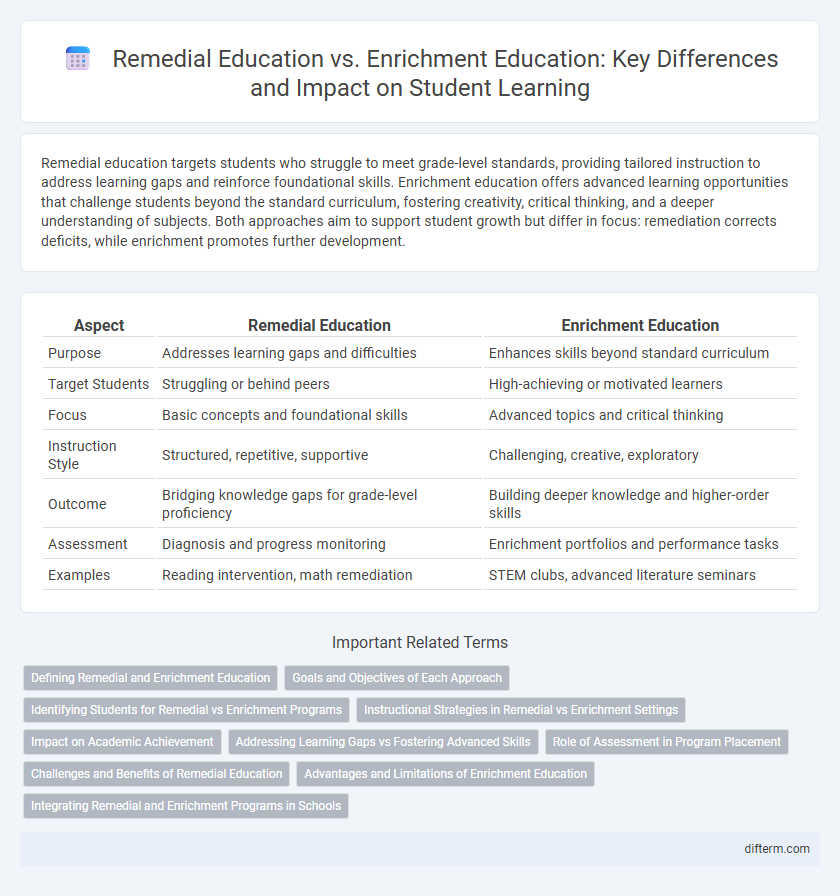Remedial education targets students who struggle to meet grade-level standards, providing tailored instruction to address learning gaps and reinforce foundational skills. Enrichment education offers advanced learning opportunities that challenge students beyond the standard curriculum, fostering creativity, critical thinking, and a deeper understanding of subjects. Both approaches aim to support student growth but differ in focus: remediation corrects deficits, while enrichment promotes further development.
Table of Comparison
| Aspect | Remedial Education | Enrichment Education |
|---|---|---|
| Purpose | Addresses learning gaps and difficulties | Enhances skills beyond standard curriculum |
| Target Students | Struggling or behind peers | High-achieving or motivated learners |
| Focus | Basic concepts and foundational skills | Advanced topics and critical thinking |
| Instruction Style | Structured, repetitive, supportive | Challenging, creative, exploratory |
| Outcome | Bridging knowledge gaps for grade-level proficiency | Building deeper knowledge and higher-order skills |
| Assessment | Diagnosis and progress monitoring | Enrichment portfolios and performance tasks |
| Examples | Reading intervention, math remediation | STEM clubs, advanced literature seminars |
Defining Remedial and Enrichment Education
Remedial education targets students who require additional support to achieve grade-level proficiency, focusing on foundational skills in reading, writing, and mathematics. Enrichment education enhances learning experiences for advanced students, promoting critical thinking, creativity, and deeper subject understanding beyond the standard curriculum. Both approaches tailor instruction to meet diverse student needs, optimizing academic growth and engagement.
Goals and Objectives of Each Approach
Remedial education aims to address learning gaps and bring students up to grade-level proficiency by reinforcing foundational skills in core subjects such as reading, math, and writing. Enrichment education focuses on extending knowledge and skills beyond the standard curriculum to promote critical thinking, creativity, and advanced problem-solving abilities. While remedial programs target skill recovery and mastery, enrichment emphasizes intellectual growth and academic exploration.
Identifying Students for Remedial vs Enrichment Programs
Educators identify students for remedial education by assessing gaps in foundational skills through diagnostic tests and performance reviews in subjects like math and literacy. In contrast, enrichment programs target students demonstrating proficiency and advanced capabilities, often selected via standardized test scores, teacher recommendations, and demonstrated interest in deeper learning activities. Effective differentiation ensures that remedial education addresses learning deficits while enrichment fosters intellectual growth and motivation among high achievers.
Instructional Strategies in Remedial vs Enrichment Settings
Instructional strategies in remedial education prioritize targeted intervention and scaffolding techniques to address specific learning gaps, employing diagnostic assessments and individualized learning plans to accelerate foundational skill acquisition. Enrichment education focuses on differentiated instruction and project-based learning that fosters critical thinking, creativity, and deeper content exploration beyond standard curricula. Both settings utilize formative assessments but differ in pacing, with remedial emphasizing mastery of core concepts and enrichment promoting extension through complex, autonomous tasks.
Impact on Academic Achievement
Remedial education targets students struggling with foundational skills, significantly improving their academic achievement by addressing knowledge gaps and boosting confidence. Enrichment education offers advanced learning opportunities that foster critical thinking and deepen subject mastery, leading to higher academic performance among gifted and motivated learners. Both approaches enhance academic outcomes by catering to diverse student needs, ensuring personalized support and challenge.
Addressing Learning Gaps vs Fostering Advanced Skills
Remedial education targets addressing learning gaps by providing tailored instruction to help students meet grade-level standards and recover foundational skills. Enrichment education focuses on fostering advanced skills by offering challenging activities that promote critical thinking, creativity, and deeper understanding beyond the standard curriculum. Both approaches play essential roles in supporting diverse student needs, ensuring mastery and encouraging academic excellence.
Role of Assessment in Program Placement
Assessment plays a critical role in program placement by identifying students' specific academic needs and skill gaps, ensuring targeted instruction in remedial education. Accurate diagnostic tests and formative assessments help differentiate between students requiring foundational support and those ready for enrichment activities that enhance advanced competencies. Data-driven evaluation informs personalized learning pathways, optimizing educational outcomes in both remedial and enrichment programs.
Challenges and Benefits of Remedial Education
Remedial education addresses learning gaps and skill deficiencies, providing targeted support to students struggling with core subjects like math and reading, which can lead to improved academic performance and increased confidence. Challenges include the stigma associated with remedial classes, limited resources or qualified instructors, and potential delays in mastering grade-level content. Benefits encompass personalized instruction, reinforcement of foundational skills, and the opportunity to close achievement gaps, ultimately promoting equitable learning outcomes.
Advantages and Limitations of Enrichment Education
Enrichment education enhances students' critical thinking, creativity, and problem-solving skills by providing advanced learning opportunities beyond the standard curriculum. It fosters motivation and engagement in learners who seek intellectual challenges but may overlook struggling students needing foundational support. The limitation lies in its potential to widen achievement gaps if access and resources are not equitably distributed across diverse student populations.
Integrating Remedial and Enrichment Programs in Schools
Integrating remedial and enrichment programs in schools addresses diverse student needs by providing targeted support for learners lagging behind while simultaneously offering advanced opportunities to gifted students. Utilizing data-driven assessments to customize instruction ensures both remediation and enrichment foster academic growth and engagement. Collaborative efforts among educators, specialists, and families maximize the effectiveness of these programs, promoting inclusive excellence within the educational environment.
remedial education vs enrichment education Infographic

 difterm.com
difterm.com